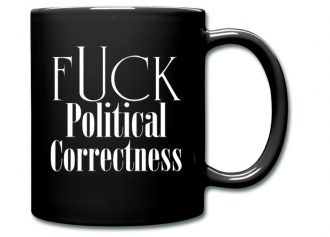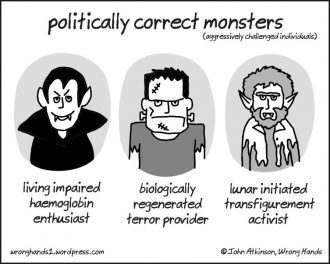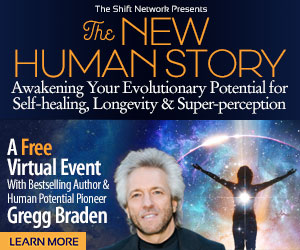By Wes Annac
Guest writer for Wake Up World
Political correctness: A doctrine of language control based on the proposition that it is entirely possible to pick up a turd by the clean end.
In the last few years, there’s been an effort to eliminate from society any form of social commentary, including comedic, considered offensive to certain people or groups. The driving force behind this is the political correctness (PC) movement. At first glance this movement seems like the result of an increasing number of people desiring to leave behind the cruel and ignorant attitudes pervasive here in the U.S. throughout its history. However, it has evolved over time into a form of self-righteous censorship, often aimed at people who see our world for what it is, and think we should all lighten up.
We Need to Laugh at Ourselves
I don’t refer to the conservative pundit who spouts ignorant, hateful nonsense while complaining about the censorship imposed by PC culture. I refer primarily to comedians and TV writers who push society’s buttons and boundaries, because they don’t see a reason to take all of this so seriously. They bring to the table the perspective that if we can’t laugh at this madness we call life, we will fail. They cross barriers in the boldest and most offensive ways, because they know these barriers are the flimsy, unnecessary results of a world that takes itself too seriously and has forgotten how to laugh.
Just like forgetting how to laugh at our absurd society will inevitably spell failure, if you can’t laugh at yourself or your beliefs then you’ll fail to find the peace or happiness you intend for them to bring you. Beliefs don’t matter; your perspective and attitude do. If you can laugh at those things you take so seriously, you can lighten your perspective and watch as life lightens up in response.
Obscenity Encourages Introspection
PC culture attempts to censor humorous and relevant yet often obscene jokes said by comedians or written into TV shows by convincing society that they have no value or relevance in this new age. This isn’t true.
The purpose of the provocative crudeness we witness on TV is not always just to shock us. Its purpose is often to encourage us to take a look at ourselves and the things we consider beyond the reach of ridicule so we can (hopefully) see how silly this mindset is.
No matter how offensive some of the things you see from these people are, their lack of seriousness and their willingness to laugh at everyone and everything are, in my opinion, enlightened qualities beyond the reach of many spiritual seekers.
A Unique Kind of Education
They don’t take themselves or the world as seriously as everyone waiting for the next thing to be upset about.
This gives them the freedom to laugh at the world and anything in it they find funny. They may offend people too rooted in their beliefs or their cause to let go, lighten up and learn to take a joke, but their goal isn’t solely to be provocative.
That’s a part of their goal, because it provides the kind of education that can only be brought about by something big that causes serious introspection. What better way to get you to take a look at yourself and the things you revere than to mock them with the implied encouragement to observe your reaction?
The Disappearance of Real Social Commentary
PC culture doesn’t see it this way. If its brand of narrow-mindedness catches on, it could cause genuinely valuable messages about society that are embedded in offensive jokes to go unnoticed in the wake of the backlash that would result.
It’s no secret that people are prone to impulsive and exaggerative outrage. If we aren’t careful, this could result in the disappearance of the real social commentary we no longer expect from our leaders but depend on artists of all kinds to provide. It would be replaced with the PC movement’s hollow, sugarcoated unity, which won’t last because it’s not authentic.
It’s great that acceptance for all people has become a mainstream trend because it represents a shift away from how this country used to be, but it seems like a forced result of our collective guilt over the past. Unsurprisingly, it’s been taken too far.
“Political correctness is America’s newest form of intolerance, and it is especially pernicious because it comes disguised as tolerance. It presents itself as fairness, yet attempts to restrict and control people’s language with strict codes and rigid rules. I’m not sure that’s the way to fight discrimination. I’m not sure silencing people or forcing them to alter their speech is the best method for solving problems that go much deeper than speech.” ~ George Carlin
Rethinking Equality
My opinion is that PC culture at best needs reworked and at worst is a new form of censorship imposed on creative minds with a dirty mouth who nevertheless have valuable commentary to offer. With that established, let’s take a look at one of the philosophical foundations on which PC culture is built: We are all the same and we should all accept each other (and be nice to each other). Despite the arguably shady aims PC culture is using this viewpoint to achieve, I couldn’t agree with it more.
One problem with the PC culture’s version of it is that it only extends to certain people or groups while it seems like others are fair game. I’m all for equality and acceptance, but to me, equality means everyone is subjected to the same conditions and treatment. No cherry-picking our favorites and turning a blind eye to the rest. If you’re going to accept one group, accept them all. If you’re going to satirize, critique or make fun of one group, make fun of them all. This is equality. But it’s also where the line is blurred and outrage becomes likely.
Truth Through Comedy
There’s something people prone to outrage should know about offensive comedians, TV writers and satirists: they’re joking. They’re just having fun, even if it’s at the expense of others. Interestingly, it’s with these jokes that they make us aware of profound things about our world and the way we interact with each other.
They don’t always have something against the people or things they poke fun at. They just have a different, more outrageous perspective on it that we consider offensive.
A lot of it is offensive; so much so that in my opinion, you can’t help but see that it’s satire and meant more for those who don’t resort to big or impulsive emotional responses when something offends them.
Targeting Everyone
In terms of their level of satire and detachment from reality, these shows are like the mainstream news but more brutally honest, and thus, truthful. While lazy comedians or writers will often target the same groups of people with lowbrow, half-baked jokes, other more intelligent ones have no problem subjecting every type of person to the similarly brutal yet thoughtful satirical treatment.
Again, this is an example of equality in action: treating everyone the same even if you don’t treat them well.
We envision equality as treating everyone the same and treating them well at the same time. These people are here to shatter that stereotype and make us aware of true equality in a way that even the most inspired rally for peace, love and unity would fail to achieve. This is one of many problems with the PC movement’s attempted censorship of people who have something genuine to say, even if their truth is wrapped in a cloak of profanity. Don’t let that deter you from considering the message hidden in some of your favorite or least favorite shows, because it’s there waiting to be discovered.
No More Recreational Outrage
The first step to true equality could very well be for everyone to learn to take a joke, even if it’s about their religion or something else they’re passionate about. Perhaps laughing about our differences and the things we consider sacred is the key to unity. I can’t envision humanity coming together any time soon if we can’t all take a joke. Humor could be the glue that keeps us together. Maybe if we can laugh at ourselves and each other, we can realize we’re not so different and develop a sense of respect for one another. This respect can extend to every culture and continent, but only if we all learn to laugh again.
Comedian Joe Rogan once referred to the instances of mass anger over things comedians post into Twitter or write into their acts as “recreational outrage”, meaning a person is offended simply because they have the opportunity to be. Comedians and TV shows purposely provide ample opportunities for the outrage bandwagon to fill to capacity, and I’d imagine they treat the outrage against them with the same lack of seriousness that inspired their jokes. In my opinion, this is exactly what they should do.
Provocative Jokes Have Evolved
I consider my religion to be love, and I believe we should treat each other with compassion and respect. However, I know that by this point there are aspects of society – such as satire and the move toward dirty or provocative jokes, sometimes at the expense of entire groups of people – that have come too far to be cast away through recreational outrage or the ultra-liberal censorship it inspires.
Shows like South Park that most people only see as offensive have evolved to provide meaningful social commentary on a number of issues that occupy our short attention span. They haven’t left behind the obscenity they became famous for, nor should they because they’d be cut off from their roots and become something they’re not. These shows would become a shadow of what they once were if they took out the dirty jokes, because they’d miss the element that I’d imagine drives their work: the fun that comes with being as offensive or, as society calls it, “controversial” as you want.
Sure, you may dip into your dark side to do it and you’ll most likely make a lot of people mad or uncomfortable. At this point, however, the crudeness we’ve come to associate with these forms of entertainment are now blended with messages about society, the way we live and the ridiculousness of it all that, in my opinion, no activist or spiritual seeker should miss.
TV and Movies: Genuine Forms of Art
I don’t like television and I really don’t care for mainstream media, but TV and movies are still genuine forms of art. Too many movies and TV shows are made poorly and lazily, but there are good ones out there who’s creators aren’t as stupid, childish or bigoted as people immediately assume. There’s depth to their work even if it seems to be formed solely on a foundation of shock value, and if we’ve learned anything, it’s that shock value can be used as a tool to impart a genuine message. To censor it would be to censor the very purpose of art, which is to communicate what’s within in a way that will reach people.
In the case of obscene movies or TV shows, the creators know they’ll reach an immature audience to whom they can impart genuine, positive or at least thought provoking messages for the youth to consider. It might sound farfetched, but if you pay attention to what many of them are really saying, you might see past the clever mask of immaturity and obscenity and into the creators’ real thoughts on the world (much like the ‘grown up’ layers that are often included in children’s animated movies, for example.) You might even be impressed to see that in reality, most of these people know a lot about the issues that affect our society, and they’re able to address these issues with humor, without taking it as seriously as everyone else, which gives them the freedom to say what they really think while basically doing whatever else they want.
Conclusion
Unity is a worthwhile goal I’ll always support, but we won’t get there overnight. There are steps we have to take. As difficult as it will be for pretty much everyone, the first step will be to lighten up, stop taking ourselves seriously and have one big laugh together. If and when this happens, comedians will have a big role to play in it because they’ve been preparing us for it. Laughter brings joy, and though it might sound backward, laughing at each other could help diminish the sense of division and prejudice that drive us apart if we could just let go of hate.
Censoring art because it’s provocative prevents free expression and the encouragement of deep thought on the ways we can make the world a better place. So instead of being mad about what these comedians get away with saying, let’s consider their role in pushing society forward and realize they’ve achieved a lot more than most of us. Then, we can join them in sharing our truth in our own ways while remembering to have a good laugh at it all.

Wes Annac: I’m a twenty-something writer & blogger with an interest in spirituality, revolution, music and the transformative creative force known as love. I run Openhearted Rebel, a daily news blog dedicated to igniting a revolution of love by raising social and spiritual awareness.
I also have a personal blog, Wes Annac’s Personal Blog, in which I share writings related to spiritual philosophy, creativity, heart consciousness and revolution (among other topics).
I write from the heart and try to share informative and enlightening reading material with the rest of the conscious community. When I’m not writing or exploring nature, I’m usually making music.
You can follow Wes Annac at:
- Blog: OpenheartedRebel.com
- Facebook: Facebook.com/Wes.Annac and Facebook.com/OpenheartedRebel
- Twitter: Twitter.com/love_rebellion
Recommended articles by Wes Annac:
- Respect Nature – Don’t Bite The Hand That Feeds
- Love Rebels, Unite!
- Mushroom Magic: The Psychological and Spiritual Benefits of Psilocybin
- Can Cannabis Enhance Our Spirituality?
- 5 Obstacles on the Spiritual Path
- 5 Attachments to Release on the Path of Enlightenment
- Stand Up for Cannabis – Stand Up for Freedom!
- You’re the Solution!
- Out-Of-Body Experiences: Is It Really Possible to Leave the Body?
- An Introduction to Kundalini
- The Beginning of Something Great
- Cannabis, Consciousness and Common Sense
- Higher Consciousness and the Power of “No-Mind”

If you've ever found value in our articles, we'd greatly appreciate your support by purchasing Mindful Meditation Techniques for Kids - A Practical Guide for Adults to Empower Kids with the Gift of Inner Peace and Resilience for Life.
In the spirit of mindfulness, we encourage you to choose the paperback version. Delve into its pages away from screen glare and notifications, allowing yourself to fully immerse in the transformative practices within. The physical book enriches the learning process and serves as a tangible commitment to mindfulness, easily shared among family and friends.
Over the past few years, Wake Up World has faced significant online censorship, impacting our financial ability to stay online. Instead of soliciting donations, we're exploring win-win solutions with our readers to remain financially viable. Moving into book publishing, we hope to secure ongoing funds to continue our mission. With over 8,500 articles published in the past 13 years, we are committed to keeping our content free and accessible to everyone, without resorting to a paywall.









